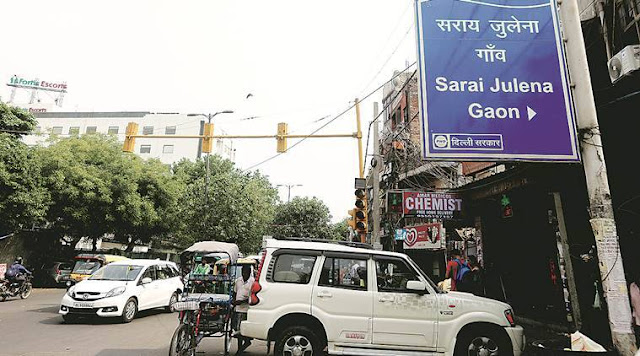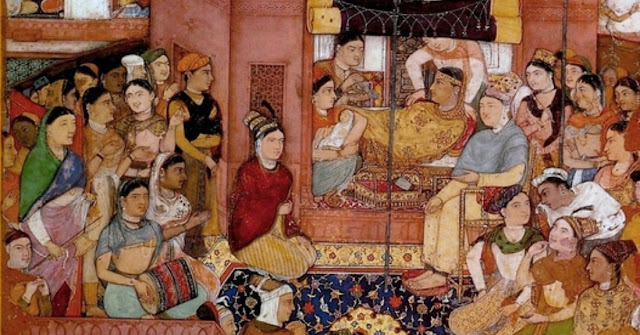This is an unusual love affair between a Portuguese Slave Girl and a Indian Mughal prince which describes the intensity of her love that the Portuguese slave girl by the name Dona Juliana Dias Da Costa(1658–1733), had over Shah Alam, the son of Aurangzeb.
 |
| Dona Juliana |
It is said that she not only assisted in
safeguarding the Christian in then Mughal-ruled India but was also responsible
in spreading the faith in Portuguese India.
Dona Juliana Dias da Costa was considered to
be a woman of Portuguese origin from Kochi in the court of Aurangzeb the Mughal
Empire in Hindustan. She became Harem-Queen to the Mughal Emperor of India.
 |
| Dona Julian |
Bahadur Shah I the son of Aurangzeb who
became the monarch in 1707.
In
the suburban village of Okhla, one of the oldest in Delhi, stands a tall board
that reads ‘Sarai Julena Gaon’. This signboard is the last remaining proof of a
sarai, or rest house, built for weary travellers built in the 18th century.
Today, the area houses DDA (Delhi Development Authority) flats.
 |
| Sarai Juliana |
The architect of this lost structure was a woman who once held much
importance in the Mughal courts, even though she was a Christian and the
daughter of a maid in the palace.
At 17 - Youngest Tutor to Muazzam/Shah Alam
Aurangzeb entrusted the education of Prince
Muazzam (later Shah Alam), his second son, to Juliana. She was 17 and he was 18
at the time.
Muazzam was “filled with remorse for the
merciless imprisonment of his grandfather Shah Jahan”, and the “seeds of a
lifelong affair were sown”.
The
prince held much contempt against his father, who had him imprisoned at one
point for suspected treason. A loyal Juliana stuck by Muazzam’s side to the
point where she risked her own life to give him a comfortable life in prison
for seven long years, smuggling in gifts and other items of luxury.
 |
| Muazzam-Shah Alam |
 |
| Aurangzeb receiving his son prince Muazzam in his court |
 |
| Life Style of that time |
Shah Baradur's gratitude towards Dona Juliana knew no limits. In view of Juliana's trust in prayer, he gave her this title: "Juliana Fiddawie", or "Juliana devoted to prayer". Moreover he sent her presents valued about ninety thousand rupees and made over to her four villages yielding a yearly income of fifty-thousand rupees.
He
also set apart the palace which once belonged to his unfortunate uncle Prince
Dara Shikoh, for her place of residence. Many other titles were conferred upon
her, but the one she herself appears to have cherished most was "Fiddawie
Badahur Shah Juliana", or "Juliana devoted to Shah Baradur".
Whenever Dona Juliana went out her long
retinue included two elephants richly caparisoned and on them were borne aloft
two gorgeous vermillion standards with white crosses.
Finally, out of regard for her the Emperor
created a new dignity, known as "the Juliana", i. e., the dignity of
crowning the Emperor, a position which became hereditary in her family after
her death.
After the death of Bahadur Shah in 1712,
Farrukh Siyar ascended the throne in 1713 through violent struggle. When he was
ill as a result of painful carbuncle, Juliana helped him with her knowledge of
natural medicine plus Christian prayers.
The END
Disclaimer–Blogger has
prepared this short write up with help of materials and images available on
net. Images on this blog are posted to make the text interesting.The materials
and images are the copy right of original writers. The copyright of these
materials are with the respective owners.Blogger is thankful to original
writers.
2 comments:
very interesting to know. I use to live in Okhala , very long time back...
quite amazing to know the history behind the name
Thanks dear friend.Aapne apna qeemti waqt nikal kar is blog ko padha. Wish you a happy Merry Christmas.
Post a Comment